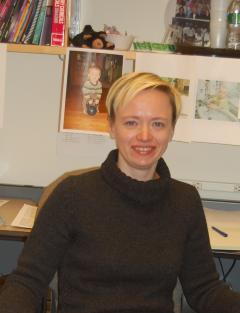-
About
- Departments & Offices
-
Academics
- Public Health
- Biomedical Sciences
- Physician Assistant
- Special Master’s (MBS)
-
Admissions & Financial Aid
- Tuition & Fees
-
Student Experience
-
- Student Resources by Program
- Academic & Student Support
- Wellness & Wellbeing
- Student Life
- Events & Traditions
-
-
Research
- Research Labs & Centers
- Tufts University-Tufts Medicine Research Enterprise
-
Local & Global Engagement
- Global Health Programs
- Community Engagement

Ekaterina Heldwein
(617) 636-0858
136 Harrison Avenue

Research/Areas of Interest
The work in my laboratory focuses on herpesviruses. These large, complex, and ancient viruses infect most of the world's population for life and can cause a number of ailments ranging from cold sores to blindness, encephalitis, and cancers. Development of new therapeutic approaches to lessen the burden of herpesvirus diseases requires a deeper understanding of how herpesviruses manipulate their hosts. Research in my laboratory aims to answer three broad questions: How do herpesviruses enter cells to initiate infection? How are progeny virions assembled and released from the cells? How do virions move in infected cells? To gain deeper insight into molecular mechanisms of the herpesvirus life cycle, we harness the power of structural biology, biochemistry, biophysics and cell biology. Our long-term goal is to translate this resulting body of mechanistic knowledge to the discovery of new and effective antivirals.
Education
- Doctor of Philosophy, Oregon Health & Science University, Portland, United States, 1999
- Master of Science, Moscow State University, RUS, 1994
Biography
Katya received her PhD from Oregon Health Sciences University in Portland, OR where she studied ligand recognition by bacterial transcription regulators using x-ray crystallography in the laboratory of Richard Brennan. She then did her postdoctoral work at Harvard Medical School in the laboratory of Stephen Harrison where she initially worked on clathrin adaptor complexes and later delved into herpesvirus cell entry. She opened her own laboratory at Tufts University School of Medicine in the Fall of 2006.